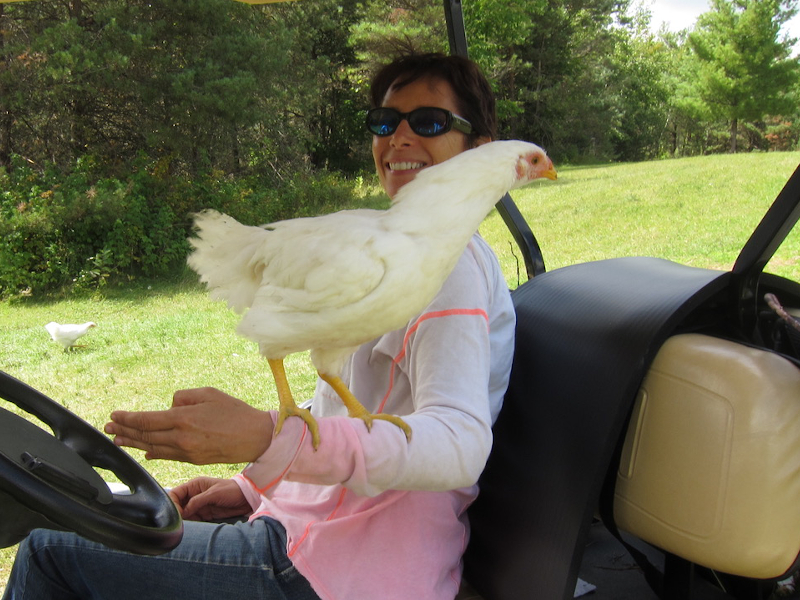Right now, Darlene Litman has only three live chickens pecking away in her backyard and about another 100 freshly deceased birds wrapped in plastic in a nearby freezer. They’re waiting for a good home where people can enjoy the succulent pleasures of locally sourced and ethically raised “heritage breed” chickens.
Litman’s plan is to make this small clutch of poultry into an ongoing business in which kosher consumers who don’t mind paying a premium can enjoy the benefits of consuming free-range, antibiotic-free birds whose ancestry differs from the commercial poultry widely available in grocery stores today.
On Sept. 12, Litman hosted a tasting event at her Toronto home in conjunction with Shoresh, a Jewish organization that seeks to “take care of the earth by connecting people, land and Jewish tradition.”
About 60 supporters were treated to taste-testing of 32 of the heritage birds, prepared by chefs from Ely’s Fine Foods.
It’s the first step in Litman’s plan to generate consumer interest in the poultry. Litman said she’s marketing them as “slow-growing seasonal chicken” to distinguish them from the factory-farmed Cornish cross breed, which are the most commonly sold chickens in grocery stores today.
Cornish cross chickens are bred to have large breasts – providing more white meat – to put on weight quickly even while being fed less than traditional breeds, and to be more economical to produce. Unfortunately, the birds’ lifespans are short, they are often unhealthy and they are so big they can barely walk, Litman said.
Rare breeds: eat them to save them.
– Darlene Litman
The chickens Litman served on Sept. 12 were Sasso chickens, a slow-growth heritage breed that reaches five pounds in 12 weeks. By contrast, Cornish cross birds attain that weight in half the time.
Slow-growth chickens are longer, have smaller breasts and have more flavour than Cornish cross chickens, she said.
Moreover, they are raised humanely, are of high quality and are a breed whose genetic character should be preserved at a time when more and more farmers stick to Cornish cross.
Litman’s slogan promoting her idea is: “Rare breeds: eat them to save them.”
Litman believes there is a market for the poultry, albeit a limited one given the rather steep price point – currently $50 apiece.
Litman purchased the chickens from a farmer near Meaford, Ont., about 180 kilometres northwest of Toronto.
After lengthy negotiations, she forged an agreement with Premier Kosher, which supplies COR-certified chickens to the Ontario market, to slaughter and prepare the birds for sale.

Her idea, at present, is to offer a direct-to-buyer supply chain of frozen chickens, eventually attaining the critical mass, customer base and logistics to offer customers fresh birds.
At least, that’s her hope.
It’s a desire supported by Shoresh, said Sabrina Malach, the organization’s director of engagement.
Shoresh is dedicated to promoting the consumption of products that are raised in an environmentally friendly way, are sustainable, kosher and preserve the genetic diversity of the species, she said.
Jews interested in consuming meat products are increasingly looking for “meat that’s fit to eat from a Jewish perspective in the 21st century,” Malach said.
There are few options available in Canada, but south of the border, a couple of companies, Grow and Behold, and Kolfoods, are thriving by meeting the consumer desire for the naturally raised poultry. A handful of Toronto consumers purchase the birds, but they have to shlep to Buffalo, N.Y., to pick up their orders. What Litman is offering would certainly make consuming heritage breed kosher chickens much easier, she said.
Litman’s interest in raising chickens dates back to 2007. “It originally started to teach my kids where their food came from.”
As a happy byproduct of the husbandry lesson, the family enjoyed free-range eggs daily, which were much tastier and healthier than the eggs you get in supermarkets, she said.
Of course, backyard chickens do not a business make. Litman has a relationship with a farmer in Meaford, and there are other poultry producers who are raising Chantecler chickens, which are more suitable for Canada’s harsh climate, who potentially could be her supplier in the future.
At $50 a head, it won’t exactly make for a chicken in every pot, but for some families who are willing to pay the price, slow-growing seasonal chicken might be an option in the not-too-distant future.
For more information, email [email protected].
